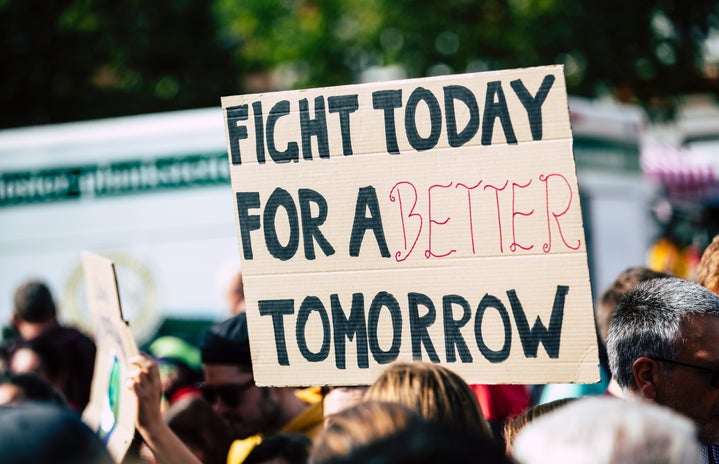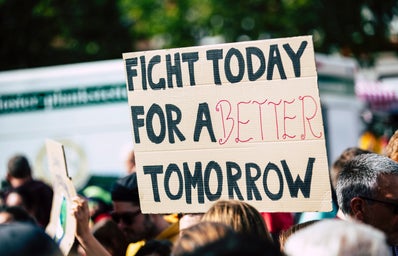UF is used to this whole protest thing.
The University of Florida is no stranger to political unrest and protests led by the student body. While not always campaigning against their institution, students are extremely conscious of the power their voice has and the full extent of the First Amendment.
Since UF was established in 1906, there have been countless protests, petitions and sit-ins, all of varying success. Below I have compiled some of the most notable protests throughout the last 116 years and examined how loud, and successful, they all were.
Racial Equality
1955: Desegregate UF
After the Brown v. Board of Education Supreme Court decision, calls around the country sounded for public schools to desegregate; UF was no different.
Virgil Hawkins, a Black central Florida native who wanted to attend law school at UF and was denied admission on the premise that a “separate but equal” law school at FAMU was being established, was the central figure in this drive to desegregate the university. In support, 425 students, 5% of the undergraduate enrollment at the time, came together to petition for Black students to join the school.
While this petition had little to no influence on the eventual integration of the school, which allowed for George Allen to be UF’s first Black student and first law school graduate, it remains a definitive moment that demonstrates the voice of a united student body can advocate for a singular cause.
April 15, 1971: Black Thursday
Black Thursday deserves its own article. It isknown as one of the bleakest days in UF’s history. Several hundred students were gassed, more than 60 were arrested and charged with trespassing and property was damaged as a result of President Stephen O’Connell refusal to meet with Black students and listen to their demands, which included seemingly simple matters like increasing diversity among students and faculty. Two weeks after being ignored, 123 Black students withdrew from UF, two faculty members resigned and Roy Mitchell, UF’s coordinator for minority affairs and first Black administrator, was fired.
Eventually, their demands were met. A genuine effort to hire more Black faculty and staff members and to recruit Black students began.
1991: BAM! Protest against Student Government
UF’s Black Awareness Movement conducted a peaceful protest and takeover of Student Government after they failed to adequately allocate funds to Black History Month initiatives. After 10 students had a sit-in at the SG offices for three hours, student senators more than tripled the celebrations budget from the original $9,000 to about $30,000.
This follows an incident where swastikas and racist slogans like “KKK” and “White Awareness Movement” were spray painted on the UF Institute of Black Culture building, whose perpetrator was never identified.
2001: Asian Students Rally Against Hate
In 2001, Delta Tau Delta held a “Mekong Delta” party, where the fraternity members dressed as American G.I.’s and women dressed as Vietnamese prostitutes. It was also reported that frat members decorated the house with fake barbed wire, sandbags, and grass to “emulate the environment of Southern Vietnam.” Attendee’s appropriated Vietnamese culture and reinforced stereotypes: Girls wore chopsticks in their hair, and guys wore “rice hats.”
In the wake, “Rally Against Hate” protests against the party were held, under the unified “race is not a party” front. Although this did not affect the fraternity house, and a similar party was thrown the next year, it did bring much-needed attention to the issue and educated otherwise ignorant people as to why this party theme was not okay.
2009: Reinstating Korean Program Courses
Due to the economic recession of 2009, budget cuts impacted the foreign language programs, threatening the existence of Vietnamese language courses and cutting Korean language instruction completely.
But, after 11 years, due to a surge in student interest and a petition signed by 123 students, the Korean language program was brought back to stay.
Anti-War
October 15, 1969: Gentle Wednesday
In conjunction with national protests held by the Vietnam Moratorium, the University of Florida Student Mobilization Committee (SMC) organized what is known as Gentle Wednesday. Around 1,800 students and faculty gathered in the Plaza of the Americas. Protesters purchased red and black armbands with “644,000” printed on them that represented the estimated number of U.S. casualties in the Vietnam War.
May 6, 1970: Day of Mourning for Kent State Protestors
Less than a year later, after the murder of four and injury of nine Kent State students non-violently protesting the Vietnam War’s expansion into Cambodia by the Ohio National Guardsman, UF students called for a suspension of classes in protest. President O’Connell had previously declared a day of mourning but did not cancel classes. In protest, about 3,000 students went on strike, marching up to his front door, forcing O’Connell to close the university from May 6-8.
Protests against the University
October 19, 2017: Richard Spencer
One of the most well-known protests in UF’s history, in my mind, is the effort to diminish the alt-right extremist (to put it lightly) Richard Spencer.
After the murderous rallies by neo-Nazis and white supremacists in Charlottesville, Virginia, on the University of Virginia’s campus, Spencer and his supporters sent out to spread their message to other universities around the country.
Spencer led a torch rally during the weekend and supported those white supremacist who were arrested for their participation.
Public institutions legally can’t deny a speaker’s request to speak on their campus solely due to their ideology and can only do so if there is a genuine safety concern. This is what UF did when Spencer asked to come the first time just days after the Charlottesville incident, which was blocked due to the credible concern.
This justification did not work two months later when the university could not state a safety concern as reasoning to prevent Spencer’s presence,, so he was allowed to come. President Fuchs condemned this, advising students to stay away and ignore the rally as a form of protest, but that simply wasn’t going to cut it for many.
Roughly 2,500 protesters, led by five UF students of color, drowned out Spencer’s hateful speech and forced the white supremacist to leave the stage half an hour before the scheduled end of his event. This set off a domino effect, leading other universities that planned to host Spencer next, like Ohio State University, to cancel his appearance.
October 2020: Calls for Name Change for the Racist Buildings
Julius Wayne Reitz was a former UF president who served from 1955-1967 and passionately supported segregation and allowed the Florida Legislative Investigating Committee – a.k.a. the Johns Committee – to accuse UF students and faculty of being homosexual, resulting in numerous expulsions and firings.
Stephen C. O’Connell, Reitz’ successor, also had a racist past. As Chief Justice of the Florida Supreme Court, he was one of the judges to strike down Virgil Hawkins’ appeal to reverse his denial to UF. He also refused to meet with Black students to discuss changes they wanted on campus, resulting in the events of Black Thursday.
In mid-June, President Fuchs announced a number of initiatives to address racism on campus, including a special task force that will assess whether particular campus buildings should be renamed. The lack of progress four months later led to protests.
Obviously, nothing has changed. But this discussion of renaming these iconic campus buildings was only brought to the university’s attention because of student efforts who have continued to pressure the university over the last ten years.
November 2021: Protest Against New Gas-Powered Energy Plant
Considered to be a massive step-back in green energy policy, the new power plant approved in the summer of 2021 will rely on methane-containing gas and will produce steam and electricity. Students and faculty pushed for more eco-conscious plans, such as a solar-power plant, but were met with shut ears. UF claims this is the most financially viable, ecologically advanced and forward-looking plan they could come up with, and will eventually allow them to be energy independent.
Despite statements of commitment to reach carbon neutrality by 2025, protesters said it isn’t possible if the emissions are reduced by only 25%, like the university stated, and methane is the worst energy source UF could have chosen behind coal.
The construction is expected to begin in 2023, with the plant located behind the commuter parking lot on Gale Lemerand Drive and south of Museum Road.
November 2021: Academic Freedom
Although UF routinely allows professors to testify as expert witnesses in cases where they have expertise, three professors were barred from doing so in cases concerning voting rights in the state of Florida.
As required, faculty must receive permission from the UF Conflict of Interest Office to ensure there are no potential conflicts. With issues pertaining simple American citizen rights, like the right to vote, they figured there would be no problem. Sadly, that wasn’t the case, and many are blaming Gov. Ron DeSantis’ efforts to censor his constituents through restrictive voting laws under the guise of cracking down on voter fraud.
This incident, along with reports of orders to destroy COVID-19 data and the removal of Critical Race Theory from instruction, put UF in the national spotlight.
Even a federal judge was tasked to weigh in on the case with the three professors, and The Southern Association of Colleges and Schools Commission on Colleges, who accredits UF, investigated the validity of their designation.
April 2022: Graduate Assistant Protest for a Livable Wage
UF Graduate Assistants United have long protested for better working and living conditions, including demands to increase wages and giving graduate assistants eight weeks paid family leave. The dedication from this collective group is the only reason changes have been made, and while they haven’t been the exact solutions they requested, change is happening slowly but surely. This is a continuing story, and the eventual measure of success might be long in the future, but so far it is trending in the right direction.
October 2022: Ben Sasse
Need I say more.
Protests are still active, and their success is yet to be seen, but Her Campus UFL writer Avery Worley wrote a fantastic article about the entire controversy, the protest at his first campus appearance, and student reactions that I would definitely recommend taking a look at. This is a developing story, and the next protest is planned for Nov. 1, when the Board of Trustees officially interviews Sassee for the job.


